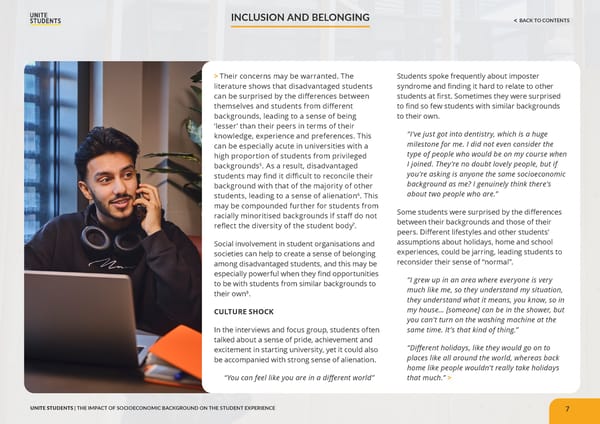< BACK TO CONTENTS UNITE STUDENTS | THE IMPACT OF SOCIOECONOMIC BACKGROUND ON THE STUDENT EXPERIENCE 7 INCLUSION AND BELONGING > Their concerns may be warranted. The literature shows that disadvantaged students can be surprised by the differences between themselves and students from different backgrounds, leading to a sense of being ‘lesser’ than their peers in terms of their knowledge, experience and preferences. This can be especially acute in universities with a high proportion of students from privileged backgrounds5. As a result, disadvantaged students may find it difficult to reconcile their background with that of the majority of other students, leading to a sense of alienation6. This may be compounded further for students from racially minoritised backgrounds if staff do not reflect the diversity of the student body7. Social involvement in student organisations and societies can help to create a sense of belonging among disadvantaged students, and this may be especially powerful when they find opportunities to be with students from similar backgrounds to their own8. CULTURE SHOCK In the interviews and focus group, students often talked about a sense of pride, achievement and excitement in starting university, yet it could also be accompanied with strong sense of alienation. “You can feel like you are in a different world” Students spoke frequently about imposter syndrome and finding it hard to relate to other students at first. Sometimes they were surprised to find so few students with similar backgrounds to their own. “I’ve just got into dentistry, which is a huge milestone for me. I did not even consider the type of people who would be on my course when I joined. They’re no doubt lovely people, but if you’re asking is anyone the same socioeconomic background as me? I genuinely think there’s about two people who are.” Some students were surprised by the differences between their backgrounds and those of their peers. Different lifestyles and other students’ assumptions about holidays, home and school experiences, could be jarring, leading students to reconsider their sense of “normal”. “I grew up in an area where everyone is very much like me, so they understand my situation, they understand what it means, you know, so in my house… [someone] can be in the shower, but you can’t turn on the washing machine at the same time. It’s that kind of thing.” “Different holidays, like they would go on to places like all around the world, whereas back home like people wouldn’t really take holidays that much.” >
 "A Different World": The Impact of Socioeconomic Background on the Student Experience Page 6 Page 8
"A Different World": The Impact of Socioeconomic Background on the Student Experience Page 6 Page 8